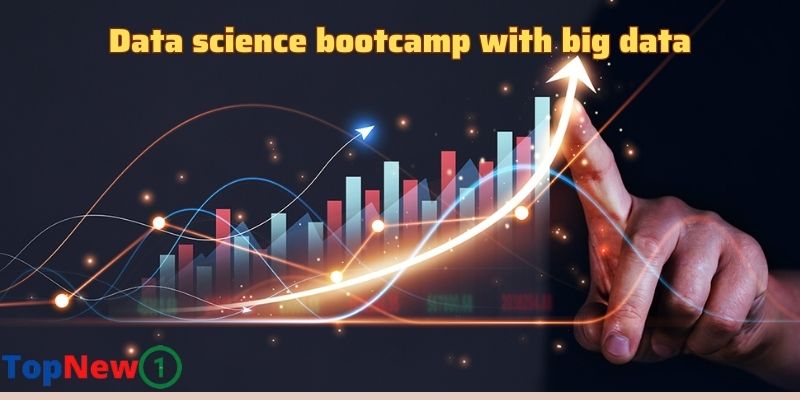Data science bootcamp with big data
Data science bootcamp with big data analytics is a trending topic. Big data analytics and data science are the future, according to the industry’s growth tendency in the data segment. Both of these disciplines have great potential for growth in this market.Big Data is a significant collection of data that has been gathered in both structured and unstructured formats, but it requires additional procedures and processes to reveal the underlying data.
As a result, massive data processing for commercial decision-making is impossible without data science. Big data is handled by data science, which transforms, analyzes, and visualizes it to produce valuable insights. As a result, each is unique yet complimentary, and each has its own value and relevance. You can start with the best comprehensive online data science course to launch your career in order to increase your knowledge and skills in the field.
Contents
Difference Between Data science bootcamp with big data
Below topnewone.com have explained the differences between https://topnewone.com/data-science-boo…mp-with-big-data.html alongside their parameters:
Data science bootcamp with big data: Definition

Data science is the examination of large amounts of data to gain critical business insights. It combines concepts and methods from mathematics, statistics, artificial intelligence, and computer engineering in order to analyze massive amounts of data. This study aids in providing answers to simple queries.
Big data, also referred to as the three Vs, is data that is more varied, arriving at a faster rate, and arriving in greater amounts. Big data refers to larger, more intricate data sets. They are so numerous that using standard data processing software is challenging. These massive amounts of data can, however, be used to address business problems that were previously intractable.
Data science bootcamp with big data: Concept

Data science is the process of cleaning, aligning, and processing data while combining statistics, mathematics, and programming. This adverb generally refers to a variety of information-gathering techniques. Data science covers all types of data, including unstructured, structured, and semi-structured data. It includes, among other things, processes like analysis, cleaning, and data preparation.
Big data and data science are fundamentally connected.Big data is the vast amounts of data that are processed inefficiently by the current traditional applications, whereas data science requires the capacity for new perspectives. The vast amounts of structured and unstructured data that could regularly overwhelm an organization are described.
Big data analysis insights are used to guide company decisions and actions. Big data processing begins with unprocessed raw data that is frequently too big to fit in the memory of a single machine.
Data science bootcamp with big data: Basis of Information

What distinctions exist between big data and data science in terms of the information sources used?The fundamental pieces of knowledge for data science are as follows.
- Internet users/traffic
- Electronic apparatuses (sensors, RFID, etc.)
- Live feeds and audio/video streams
- Online message boards
- Data produced by businesses (transactions, DB, spreadsheets, emails, etc.)
- Information derived from system logs
The basis of information for big data are:
- Draws conclusions using scientific approaches from a lot of data.
- Related to gathering, analyzing, and filtering data
- Find complex patterns in large amounts of data and build models.
- Programmers create functional apps using created models.
Data science bootcamp with big data: Application Areas
Application Areas of Data Science
- In order to swiftly provide users with the most pertinent results, search engines use data science approaches.
- Digital marketing uses data science algorithms for anything from display banners to digital billboards. Digital ads typically have higher click-through rates than traditional ads mainly because of this.
- Systems that provide recommendations improve user experience. Additionally, it makes it simple to pick out the right products from among the zillions of possibilities. Many companies utilize this strategy to sell their products and concepts in line with what customers desire and what information is relevant. Recommendations are given based on the results of the user’s previous searches.
Application Areas of Big Data
- In financial services, big data is used. Big data is used in the financial services provided by retail banks, institutional investment banks, private finance management advisers, insurance firms, venture capitalists, and credit card providers. The main problem in these industries is the huge distribution of multi-structured data across various diverse platforms. The issue can be fixed with the aid of big data. Numerous applications of big data exist, such as customer, compliance, fraud, and operational analytics.
- Expansion within current subscriber bases, customer retention, and customer acquisition are the top priorities for telecommunications service providers. The solution to these issues lies in our ability to combine and assess the enormous amounts of user- and machine-generated data generated every day.
- To be relevant and competitive, you must better understand your customers. To do this, one needs to be able to look at the numerous data sources that companies employ on a regular basis, such as blogs, data on customer transactions, social media, store-branded credit cards, and details from loyalty programs.
Courses on data science are helpful in understanding the subject. Your foundation can be strengthened by studying Python-based data science.

